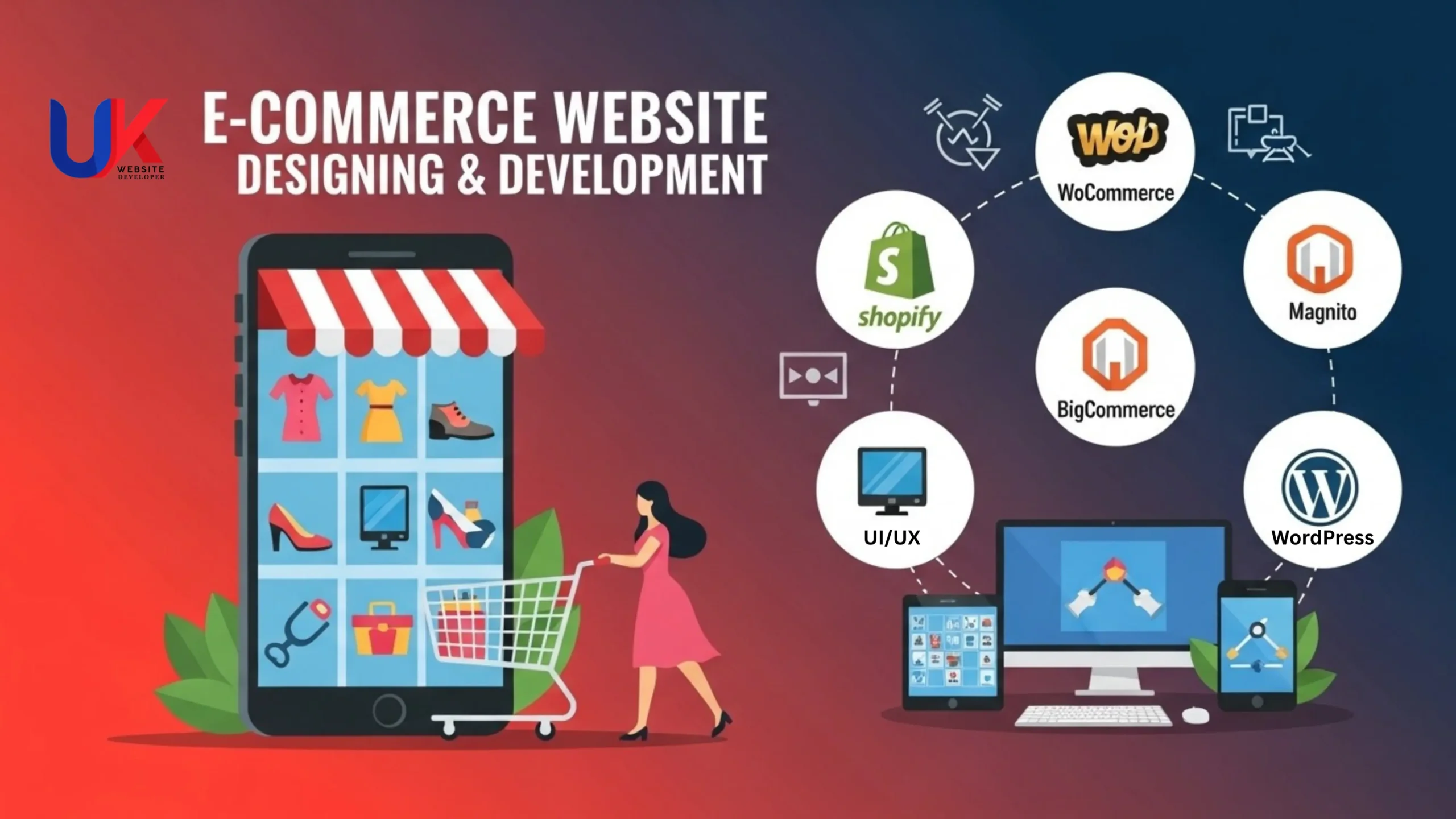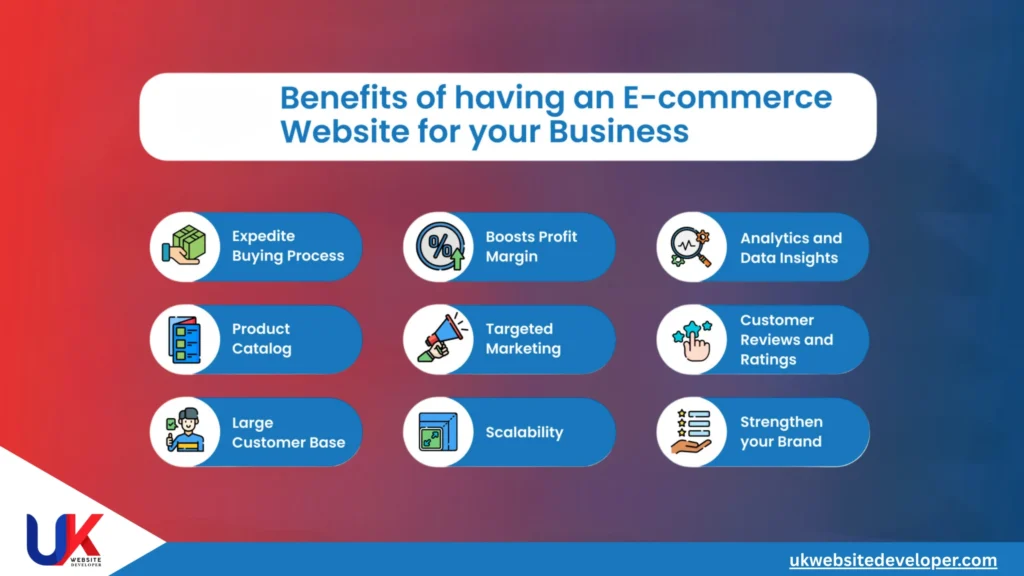Check out
Trusted Ecommerce Website Development Company in UKThe foundation of contemporary retail is ecommerce web development, which has revolutionized how companies interact with clients around the globe. Understanding the nuances of creating a profitable online store is now necessary for survival in the cutthroat industry as digital commerce develops further.
Online retail requires more than just a simple website. To meet growing customer expectations and promote sustainable growth, today’s businesses require sophisticated digital storefront development that blends state-of-the-art technology, smooth user experiences, and strong functionality.

The entire process of designing, developing, and managing online stores that enable digital transactions is known as ecommerce web development. This includes everything from backend development ecommerce, which powers the system in the background, to frontend development e-commerce, which customers interact with.
The process encompasses several critical components:
Headless commerce architectures, which offer previously unheard-of flexibility and scalability by separating the presentation layer from the commerce functionality, are becoming more and more common in modern solutions. By providing app-like experiences straight through web browsers, progressive web app technology more especially, PWA ecommerce solutions has completely changed the way online stores operate. The reach of websites and the interaction of mobile applications are combined in this strategy to provide the best of both worlds.
Revenue, customer satisfaction, and brand reputation are all directly impacted by creating a strong online presence through expert ecommerce web development. Higher conversion rates, better customer retention, and more competitive positioning are all experienced by businesses that make quality development investments.
Mobile commerce development has become particularly crucial as mobile shopping now accounts for the majority of online transactions.Whether customers shop on desktops, tablets, or smartphones, a well-designed platform guarantees responsive e-commerce design that works flawlessly across devices and offers consistent experiences.
The right development approach enables businesses to implement essential features that streamline operations:
Together, these components optimize the shopping experience, increasing lifetime value and retaining customers.
From concept to launch, a methodical approach is used to guarantee success. Establishing business objectives, target audiences, and feature requirements that complement strategic goals is the first step in the planning of an e-commerce website.
Choosing an e-commerce platform is an important first step. Each platform offers unique benefits for various business models and sizes, whether you choose to develop for Shopify, WooCommerce, Magento, or BigCommerce.
Development teams concentrate on building a solid e-commerce site architecture that promotes expansion while preserving functionality. This comprises:
Interfaces that strike a balance between functionality and aesthetics are created using the principles of UX and UI design for e-commerce. To cut down on obstacles that might stop conversions, teams give top priority to optimizing product pages and checkout user experiences.
| Platform | Best For | Key Strength | Development Flexibility |
|---|---|---|---|
| Shopify | Small to medium businesses | Ease of use, quick setup | Moderate with themes and apps |
WooCommerce | WordPress users, content-rich sites | Customization, SEO features | High with extensive plugins |
Magento | Enterprise, B2B operations | Scalability, advanced features | Very high, fully customizable |
| BigCommerce | Growing mid-market businesses | Built-in features, no transaction fees | Moderate to high flexibility |
Everything from maintenance expenses to performance is impacted by the technology stack selection. While API-first architecture facilitates smooth integration with third-party services, headless CMS e-commerce solutions offer flexibility by separating content management from presentation.
Ecommerce CMS platforms differ in how they handle the demands of e-commerce content management systems. Some place more emphasis on usability, while others use custom web app ecommerce development techniques to provide greater customization.
Modern implementations leverage technical SEO ecommerce best practices to improve search visibility:
The amount of money needed to develop an e-commerce website varies greatly depending on its features, complexity, and strategy. While custom ecommerce development projects for businesses can cost six or seven figures, basic template-based stores may only cost a few thousand dollars.
Because of the intricate pricing structures, approval processes, and integration requirements with current business systems, developing B2B ecommerce usually requires a larger investment. In a similar vein, complex architecture and more development time are required for multi-vendor e-commerce development platforms that accommodate numerous sellers.
Hosting, upkeep, security upgrades, and site performance optimization are examples of ongoing expenses. Companies need to set aside money for:
Certain fundamental skills are necessary for any successful online store. Multiple payment methods must be supported by payment gateway integration while upholding secure payment processing standards. Encrypted connections that safeguard private client information during transactions are guaranteed by SSL integration e-commerce.
Beyond simple add-to-cart capabilities, shopping cart development encompasses wish lists, saved items, and cart recovery features that recover lost purchases. The safe checkout process should take as few steps as possible while effectively gathering the required data.
Backend systems need robust capabilities:
In order to provide individualized experiences, these systems integrate with customer account systems, which store preferences, order histories, and saved data.
Implementing SEO for ecommerce websites involves more than just basic optimization. It consists of search engine optimization for product pages, optimization for the shopping experience that raises engagement metrics, and continuous site performance optimization that raises search rankings and improves user experience.
Partner with our expert ecommerce web development team today and transform your vision into a profitable digital storefront. Get your free consultation now!
Budgetary restrictions, long-term scalability requirements, and particular business requirements all play a role in the choice between platform-based solutions and custom e-commerce development. Platform solutions, such as Shopify development, are perfect for businesses with limited resources or testing markets because they provide a quicker time to market and lower upfront costs.
Maximum flexibility and control are offered by custom web app e-commerce development. Custom solutions that are not platform-limited and can adjust to changing needs are frequently advantageous for businesses with distinct workflows, specialized requirements, or large-scale plans.
Combining the advantages of well-known commerce platforms with unique frontend experiences, headless commerce is a hybrid strategy. This architecture facilitates consistent commerce functionality across various customer touchpoints, thereby supporting omnichannel e-commerce strategies.
Data migration ecommerce considerations become crucial when transitioning between platforms or upgrading systems:
Proper planning ensures smooth transitions without disrupting ongoing operations.
The results of e-commerce web development projects are greatly impacted by the team choice. Seek partners who have a track record of success in your sector, solid portfolios that highlight pertinent work, and knowledge of the platform or technology stack of your choice.
Our team specializes in building high-converting online stores that scale with your business. Schedule your free project assessment today!
Evaluate their approach to critical aspects:
responsive e-commerce design principles are given top priority by strong development partners, who also keep up with new developments like progressive web app technology.
Technical skills are important, but so are communication skills. The most successful partners work closely together during the development process, give frequent updates, clearly explain technical concepts, and are always available for post-launch assistance and continuous optimization.
Take into account their background in B2B e-commerce development if you’re serving business clients, or multi-vendor e-commerce development if it relates to your business plan. Expertise in your particular field offers important insights that general developers might overlook.

Depending on the platform (Shopify, Magento, or WooCommerce), design complexity, custom features, and system integrations, the average cost to develop an eCommerce website is between £5,000 and £25,000. This range can be exceeded by sophisticated websites with advanced features. Plugins, SSL certificates, hosting, and continuing upkeep to keep your store safe and operating at its best are extra costs.
For a detailed breakdown of pricing and features, explore our comprehensive guide on eCommerce website development costs.
In order to generate organic traffic and conversions, a successful eCommerce website needs to have a user-friendly design, secure payment processing, organized product categories, mobile optimization, strong security features (SSL certificates and data encryption), and search engine optimization.
To get started with custom website development, first define your business goals, budget, and required features. Next, research and contact 3-5 professional web development agencies to request quotes and consultations. Finally, choose a developer, finalize your project scope, and sign a contract to begin the development process typically taking 4-16 weeks from start to launch.
Platform Tools: Shopify, WooCommerce, Magento, BigCommerce
Development: React, Node.js, PHP, MySQL
Design: Figma, Adobe XD
Payment: Stripe, PayPal APIs
Analytics: Google Analytics, Hotjar
SEO: SEMrush, Yoast SEO
Testing: BrowserStack, GTmetrix
Ecommerce web development success necessitates striking a balance between robust functionality and performance optimization, technical excellence and user-focused design, and short-term demands and long-term scalability. Selecting the appropriate platform, putting the user experience first, putting in place crucial security and performance features, keeping flexibility for expansion, and working with skilled developers who share your vision are the five keys to success in 2026.
Businesses who make strategic investments in the development of digital storefronts are positioned to seize market opportunities, provide outstanding customer service, and create long-lasting competitive advantages in the rapidly growing digital marketplace as technology advances.